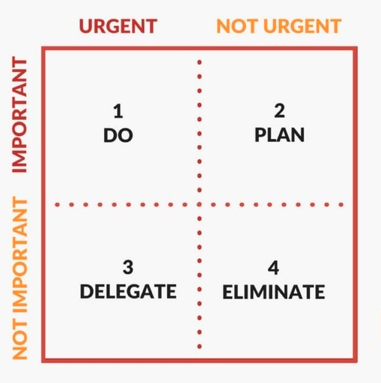Time management means planning the amount of time to spend on every daily activity, both business and non-business.
Why is time management so important? It provides many benefits, such as:
- Achieving your goals quickly (e.g. career, time for your family or your hobby);
- Control of work/life situations;
- Less stress and a greater sense of well-being;
- More productivity and higher quality results;
- Better reputation;
- Meeting deadlines.
Prioritizing your activities, eliminating sources of time waste, and meeting deadlines demonstrates that you are competent and in control of the situations around you. This increases your self-fulfillment and your reputation.
How can you know if you are managing your time in the best possible way? You need a self-analysis.
One day, write down on a sheet of paper all the activities you participate in, and when you execute each one (time). Then ask yourself if you could save time doing each activity and how. Ask yourself if each activity is necessary, proper, and if the way you do it is efficient.
Necessity exam:
- Is this activity necessary to achieve my goal?
- How useful is this activity from 1 to 10?
Appropriateness exam:
- Should I deal with this activity?
- Is there another person who should deal with this activity?
- Can I delegate this activity?
- Can I invest my time on more profitable activities?
Efficiency exam
- Is there a more efficient way to do it?
- Is there another way to do it that allows me to save time and get more results?
The outcome of this self-analysis is the elimination of useless activities, focusing on what brings you value, determining how you can save time, and obtaining more results.
In order to make the most of your time, you need to set priorities: first, focus on what is important and urgent; second, focus on what is important but not urgent. What is not important can wait or be delegated, while the tasks that are neither important nor urgent can be eliminated.

When you plan your daily schedule, you can use tools such as:
- diaries
- planning sheets
- Gantt diagrams
- PERT diagrams
Choose the most preferred and the easiest-to-use tool for your activities. Do not use complicated tools if it is not necessary, as it would be a waste of time. Often, a simple diary or a planning sheet is sufficient.
To manage your time efficiently:
- before beginning your work or study day make a list of all the activities you want to do, and assign to each activity a priority grade (A, B, C, D);
- prepare a day plan in which you write down when you perform each activity
- execute the most difficult or important activities when you are more energetic and productive, if possible (some people are more energetic in the morning, some in the afternoon, and others in the evening);
- focus on a single activity, multi-tasking lowers your performance because your attention is split between different tasks,
- avoid distractions such as emails, phone calls, messages, and music; you can set aside specific times for these tasks;
- do not overload yourself, if you are sick, you are neither productive nor happy.
In summary, plan your day by focusing on your goals, on what is important to you. You will feel more control over work situations and be more self-fulfilled.
Contact me now for consulting or training services about time and performance management… do not waste time.
Dr. Andrea Miriello
Business Psychologist
Consultant, Business Coach, and Trainer

